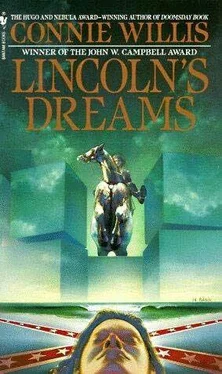Connie Willis - Lincoln’s Dreams
Здесь есть возможность читать онлайн «Connie Willis - Lincoln’s Dreams» весь текст электронной книги совершенно бесплатно (целиком полную версию без сокращений). В некоторых случаях можно слушать аудио, скачать через торрент в формате fb2 и присутствует краткое содержание. Город: New York, Год выпуска: 1992, ISBN: 1992, Издательство: Bantam Books, Жанр: Фантастика и фэнтези, на английском языке. Описание произведения, (предисловие) а так же отзывы посетителей доступны на портале библиотеки ЛибКат.
- Название:Lincoln’s Dreams
- Автор:
- Издательство:Bantam Books
- Жанр:
- Год:1992
- Город:New York
- ISBN:978-0553270259
- Рейтинг книги:3 / 5. Голосов: 1
-
Избранное:Добавить в избранное
- Отзывы:
-
Ваша оценка:
- 60
- 1
- 2
- 3
- 4
- 5
Lincoln’s Dreams: краткое содержание, описание и аннотация
Предлагаем к чтению аннотацию, описание, краткое содержание или предисловие (зависит от того, что написал сам автор книги «Lincoln’s Dreams»). Если вы не нашли необходимую информацию о книге — напишите в комментариях, мы постараемся отыскать её.
presents the story of a young historical researcher who is being pulled deeper and deeper into the time of the Civil War.
Lincoln’s Dreams — читать онлайн бесплатно полную книгу (весь текст) целиком
Ниже представлен текст книги, разбитый по страницам. Система сохранения места последней прочитанной страницы, позволяет с удобством читать онлайн бесплатно книгу «Lincoln’s Dreams», без необходимости каждый раз заново искать на чём Вы остановились. Поставьте закладку, и сможете в любой момент перейти на страницу, на которой закончили чтение.
Интервал:
Закладка:
“There couldn’t have been a hundred and ninety-one copies of it, though,” she said, as if she were trying to convince herself. “Lee didn’t have that many generals. There probably weren’t that many generals in the whole Civil War.”
I said, “You’ve had a rough day. I don’t want you to catch pneumonia. Go back to bed, and we’ll talk about this tomorrow.”
“If there weren’t a hundred and ninety-one copies, why did I dream that number?”
“It was Special Order 191. It was addressed to D. H. Hill, the man you saw on the gray horse in your dream. He claimed the message was never delivered.”
She hung up. I stood there holding the receiver until the phone began beeping. Then I went and stood by the window and looked out at the snow till it got dark.
It had started snowing again, thick heavy flakes that would cover the graves at Arlington like a blanket. I hoped Annie was asleep and dreaming of something pleasant, a dream without dead Union soldiers in it, a dream without messages.
She hadn’t asked me about D. H. Hill, and I hadn’t told her. Hill had ridden a gray horse at Antietam. He had been surveying the troops on an exposed knoll when Lee and Longstreet rode up. They dismounted to scan the field, but Hill stayed in the saddle in spite of the artillery fire. “If you insist on riding up there, and drawing the fire, give us a little interval,” Longstreet had said angrily.
Hill hadn’t even had a chance to answer. The cannonball took the horse’s front legs off, and it plunged forward onto its stumps. Hill had had one foot in the stirrup, and when he tried to get off the horse he had been unable to get his other leg over the croup of the saddle, just the way Annie had described it. Just the way she had seen it. In her dream.
CHAPTER FOUR
Traveller was a Confederate gray gelding with a black mane and tail. He was probably not a thoroughbred, though historians have gone to incredible lengths to provide him with aristocratic breeding lines, one of them even claiming he was descended from Diomed, the famous English Derby winner. He did have a thoroughbred’s intelligence and courage and incredible endurance. “He never needs whip or spur,” his owner wrote to Lee, “and will go anywhere.”
I got up early and went to the library to see what I could find out about Elavil. The drug compendium said it was a fairly mild tricyclic antidepressant with a sedative effect, and that it was frequently used in connection with insomnia. It had an assortment of minor side effects and a couple of major ones. It was contraindicated for patients with heart conditions and those who had shown a previous hypersensitivity. It didn’t say anything about dreaming of dead Union soldiers. In fact, if Richard had had Annie on Elavil she shouldn’t have been dreaming at all. The tricyclic antidepressants increased the amount of time spent in delta sleep and decreased REM sleep, which was the stage most dreams occurred in.
I asked the librarian what she had on dreams. “Not much,” Kate said. “Some pseudoscience things and Freud’s Interpretation. No, wait, I think that’s checked out.” She hit some buttons on her computer and waited for the book’s status to come up. “Yeah, that’s checked out till April ninth. Do you want to reserve it?”
“I was really looking for current research.”
She tapped some more buttons. “We’ve got a few things in the one hundreds, but nothing very up-to-date. If you know exactly what you want, I can get it through interlibrary loan. If not, I suppose the Library of Congress. Have you tried the Sleep Institute? They’ve got a really good reference library.”
“I’ll take my chances in the one hundreds,” I said.
Kate was right. There wasn’t much, and what there was was do-it-yourself dream interpretation: “To dream about a house means you are sexually repressed,” that kind of thing. Cats were a symbol of animal instincts, guns of sex, dead bodies of—surprise! —death. Horses with their front legs shot off weren’t mentioned.
I asked Kate to see if she could put together a bibliography on prodromic dreams for Broun, and went home.
The phone was ringing when I opened the door. I had set the answering machine to “message” before I left. It shouldn’t have rung more than twice before the taped message kicked m, but I counted three rings while I wrestled to get the key in the door and one more on my way up the stairs. I burst into the study.
Broun was hanging up the phone. “Who was that?” I demanded breathlessly.
“It wasn’t anyone,” he said mildly. “Whoever it was hung up before I answered. Jeff, I want you—”
“It rang four times, and you were standing right there. Why didn’t you just leave the damn thing on ‘message’ if you weren’t going to answer it?”
“Dr. Stone and I were going over some material on dreams,” he said, still mildly, and gestured toward his club chair. “Dr. Stone, I don’t think you’ve met my researcher, Jeff Johnston. Jeff, Dr. Stone is head of the Sleep Institute.”
The man who had been sitting in the club chair all this time stood up and extended his hand. “How do you do?” he said. My first thought was that Richard had sent him over to tell me to keep away from Annie, but he as smiling a polite, mildly ingratiating smile, the kind you use when you meet a total stranger, and Broun was smiling, too. My name obviously hadn’t been brought up before I got there.
“I think I may know a friend of yours,” he went on. “Richard Madison?”
I used to know him, I thought, but that was before he started telling his patients they were crazy. That was before he started seducing his patients.
“We were roommates in college,” I said.
“He’s a good man,” Dr. Stone said, dropping his hand easily, as if I had shaken it. “He’s been doing some research on insomnia, I believe.”
He’s been taking advantage of one of his patients, I thought, and he could hardly tell his boss that, so maybe Richard wasn’t the reason he was here after all.
“How well do you know Richard?” I asked.
“I’ve been in California for the past six months, working on a neurological dream-study project. I met him when I got back, but I haven’t has a chance to discuss his work with him yet,” he said, still smiling, and sat back down. “I’d only been back a few days when Mr. Broun asked me to come over and explain Lincoln’s dreams to him. I was flattered to be asked, of course, but I’m afraid I haven’t been much help. I don’t know what Lincoln’s dreams mean. Or what any dreams mean, for that matter. If they mean anything.”
“He’s had some very interesting things to say,” Broun said. “Sit down, son. I want you to hear his ideas. I called on the way down from New York and left a message telling you Dr. Stone was coming over, but I guess you didn’t get it.” He motioned toward the only other chair in the study, a rickety wooden chair he used for reaching the top shelves. The seat was piled high with books, and his cat was on top of them, sound asleep.
“I was at the library doing research on dreams and getting nowhere,” I said, relaxing a little, “so I don’t know what Lincoln’s dreams mean either.” Or why you’re here, I thought. Broun had been curious about Richard’s odd behavior the night of the reception. I wondered if he had invited Dr. Stone over to try to find out why Richard had reacted so violently to his questions about Lincoln or whether he was simply trying to “run this dream thing to ground.”
“Tell Jeff here what you were saying to me about Freud,” Broun said eagerly.
Dr. Stone leaned back into the depths of the leather chair, his hands resting easily on the padded arms, and smiled. “As I was telling Mr. Broun, dream interpretation is not a science, although Freud attempted to make his colleagues believe it was one. He claimed that dreams were a stage on which people symbolically act out the traumas and emotions that were too frightening to deal with when they were awake. A Freudian would say Lincoln’s dream was a symbolic enactment of Lincoln’s secret wishes and fears, that not only the coffin but the stairs, the guard, everything in the dream was a symbol hiding the real meaning of the dream.”
Читать дальшеИнтервал:
Закладка:
Похожие книги на «Lincoln’s Dreams»
Представляем Вашему вниманию похожие книги на «Lincoln’s Dreams» списком для выбора. Мы отобрали схожую по названию и смыслу литературу в надежде предоставить читателям больше вариантов отыскать новые, интересные, ещё непрочитанные произведения.
Обсуждение, отзывы о книге «Lincoln’s Dreams» и просто собственные мнения читателей. Оставьте ваши комментарии, напишите, что Вы думаете о произведении, его смысле или главных героях. Укажите что конкретно понравилось, а что нет, и почему Вы так считаете.












